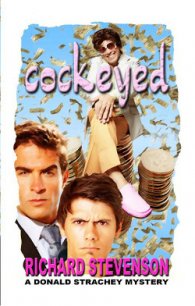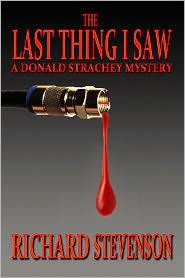On the Other Hand, Death - Stevenson Richard (читать книги полные txt) 📗
When Edith had gone, Dot smiled weakly. "Edie's hearing isn't what it once was. I guess you could tell. And, yes, she's fretful too, and forgetful and . . . every once in a while, thank the Lord, Edith is cheery and sweet and sharp as a tack. Just the way she used to be. But, oh dear, the years certainly are taking their toll. Not that that isn't to be expected. Edith's seven years older than I am, Don, did you know that? Edie will be seventy-six next month."
I wanted to say she didn't seem it, but she did. Older, in fact. Edith appeared sturdy enough, her health generally sound. But her mind was on its way out, well ahead of the rest of her. I wondered who this would happen to first—Timmy or me?
The telephone rang, and Dot sprang up to answer it. She was as light on her feet as Edith was heavy, as alert as Edith was vague and uncertain.
As Dot listened to the caller, I watched the color drain from her face. Abruptly, she slammed the receiver down. The blood returned to her cheeks and neck in a rush as she looked at me, stricken, and said, "Now they're phoning us with their horrible threats! Now this is the absolute limit!"
4
Tomorrow you die! was what the voice
on the phone had said in a harsh whisper. Dot wasn't certain whether it had been a man or a woman speaking.
I summoned McWhirter and Greco, who had just finished up the paint-over job.
"I'm calling the police again," McWhirter said, livid, and grabbed up the phone.
I said, "Good idea."
Dot sat down and shakily drank from her can of beer. While McWhirter explained to the police desk officer how he was an unwitting agent of heterosexist oppression, I asked Dot about the other families who lived on Moon Road, the ones on Crane Trefusis's list of suspects.
"I do feel sorry for them," she said, trying hard to smile and focus on something other than her fear. "We don't see much of one another, of course, but both the Deems and Wilsons seem like awfully nice people—or at least Kay Wilson does—and I do wish there was some way for them to get their money without my having to sell out to those thieves from Millpond."
She sipped at the beer, glanced once at the phone, which suddenly had become a menacing object for her, then made herself go on.
"Kay Wilson used to come up and draw water from our spring and we'd chat, but she hasn't been by since last month, when I told her we definitely weren't going to sell. And Joey Deem doesn't come by to mow the lawn anymore. It's upsetting. And I feel terribly guilty sometimes, but . . . really. This is my home. I suppose I could pick up and start over. But after thirty-eight years in one place . . . well, it's hard to tell where this house ends and I begin. It would be like cutting off an arm and a leg.
"And Edith! Oh, my. She's been with me since her Bert died in sixty-eight, and what a trial it would be for her to pull up stakes. A trial for both of us. I'd probably try to drag her off to Laguna Beach or P-town, or some other reservation for old dykes, and, oh, Lord, she'd just be fit to be tied! In case you didn't notice," she added with a little laugh, "Edith's a conservative and I'm a liberal."
I said, "I caught that."
"Well, let me tell you, young man. When I came out in seventy-nine, Edith nearly had a fit. I marched in the gay-pride parade in New York that year—that's where I met Fenton and Peter—and Edith almost drove the both of us right into the booby hatch with her fussing and carrying on. Finally she did ride along with me on the bus down to the city. But then, wouldn't you know, when the parade started up Fifth Avenue, Edith just stomped over and walked up the sidewalk alongside the parade! Her legs were better then, but she still had a devil of a time keeping up. Mad as a wet hen she was, fretting the whole time that one of the girls in our bridge club might see me on TV.
"Not that it would have mattered to me. In fact, later that summer was when I finally came out with the girls. Now there's a story I'll tell you someday, and you won't know whether to laugh or cry. There were eight of us in the bridge club back then, and now we're just five. That's a good number for poker"—she laughed—"but not worth a tinker's damn for bridge."
"It sounds pretty awkward."
"I guess that's one reason I'd like to hang on to this old house. It's like a true friend that doesn't judge us."
"You'll keep it. You'll get through this."
"Will we?" Her brown eyes were dull with exhaustion and defeat. "Sometimes I'm not so sure. After a while you
just begin to run out of steam." She heaved a deep sigh and began to fan her face with the Burpee catalog. "Well, Don, I guess there's no shortage of steam today, is there?"
I agreed that there was not. McWhirter came back from the phone, announced that he had dealt persuasively with the Albany Police Department, and said he was going to paint the rest of the barn while he awaited their arrival and their apologies for being tardy.
I said, "I'll look forward to that too."
Greco followed McWhirter outside, and I asked Dot for quick sketches of her neighbors on Moon Road, which she provided. One of them, Bill Wilson, who at the height of an argument over the Millpond situation had called Dot "a stubborn old bag" and kicked the fender of her Fiesta, sounded like a man especially worth getting to know. Though I planned on calling on all the rest of them too.
Dot adamantly refused my suggestion that she and Edith spend the next few days in a motel. Who would water the peonies? Nor would she consent to phoning any of her or Edith's children or grandchildren, all of them spread about the Sunbelt, where she and Edith visited each February. Dot said her friend Lew Morton was coming over to spend the evening, and Peter Greco had promised to return to the house by midnight with or without McWhirter, who had set a goal of recruiting at least a hundred gay national strikers that night as he moved through the Central Avenue bars and discos. The man was from Mars, but I figured Albany could stand it for a day or two. In its history as a state capital, the town had seen stranger sights.
As I bumped back up Moon Road, I passed an unmarked blue Dodge with a familiar face at the wheel heading toward Dot's. Detective Lieutenant Ned Bowman was busy avoiding potholes, but he glanced my way
as he careened past. He must have recognized me, as his eyebrows did the little dip-glide-swoop dance of horror my presence always triggered, and which over the years I'd come to look forward to in a small way.
I pulled up in front of the Deem house. The old Fury was still in the driveway, and now a cream-colored Toyota sedan was parked beside it, fresh heat undulating off its muffler. Above the house, the sun was a great white blot against the western sky. I checked my watch. It was just six-ten.
"Good evening. I'm Donald Strachey and I'm working for Millpond Plaza Associates. Are you Mrs. Deem?"
"Oh. Yes, I'm Sandra Deem. You're from Millpond? Oh, gee. Why don't you come in, Mr. Strachey? Jerry's in the shower but he'll be out in a minute." Her voice was muted, insubstantial, as if it came from a high place where the air was too thin.
"Thank you. It's hot out here."
"Oh, isn't it awful? Gosh, nobody called us from Millpond today. Is there anything new? We haven't heard from Mr. Trefusis at all for a couple weeks."
As I stepped into the living room, Mrs. Deem looked tentatively hopeful. She was thirty-sevenish, with pale skin, a plain round freckled face, and black rings of sweat around dull hazel eyes. She wore tan bermuda shorts, a sleeveless white cotton blouse, and rubber thongs on small feet. She smelled heavily of Ban.




